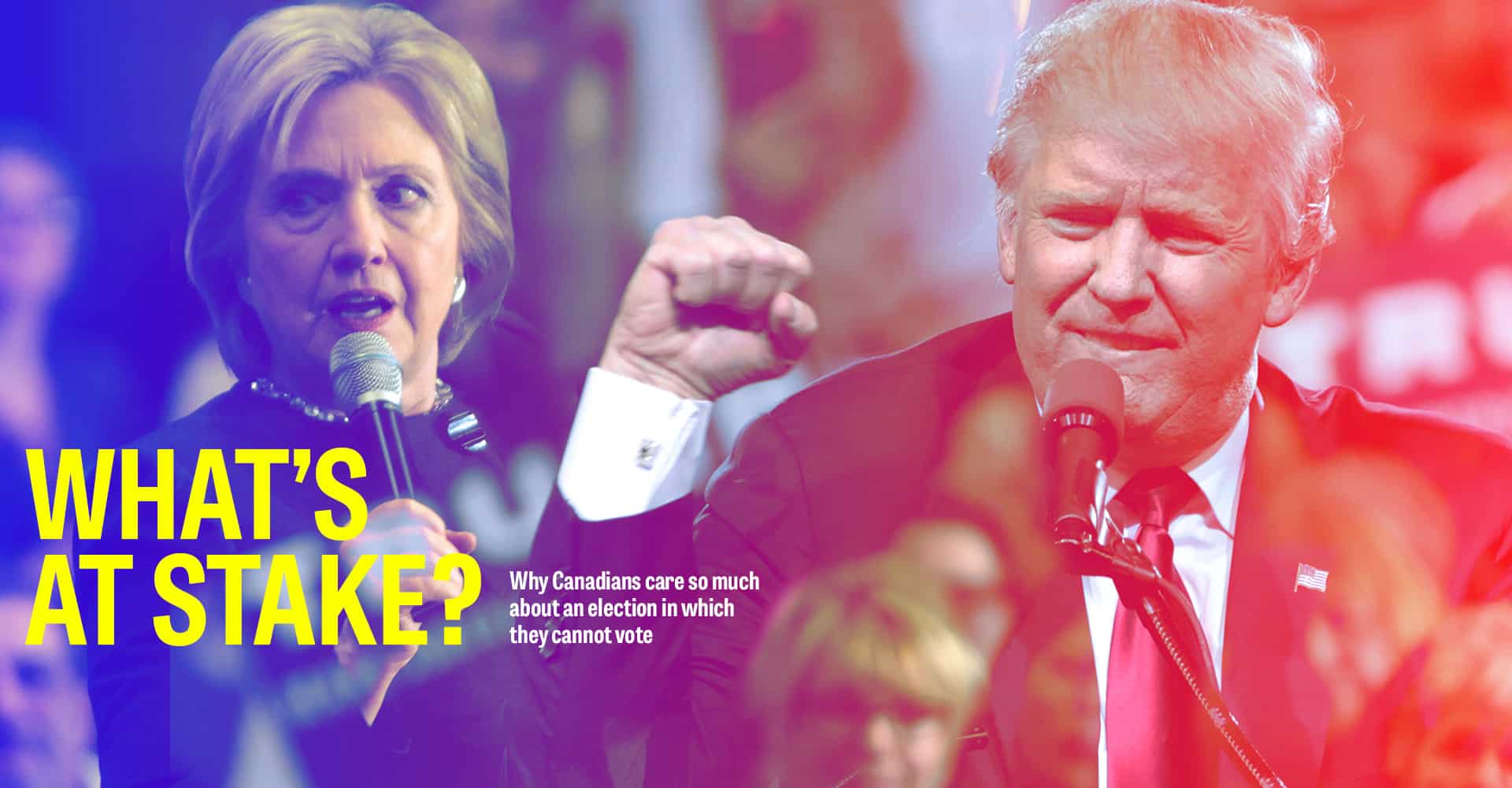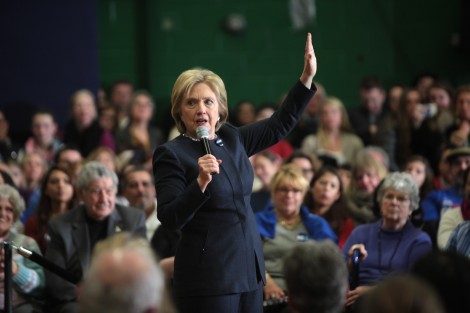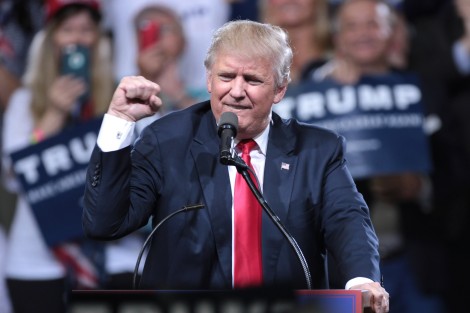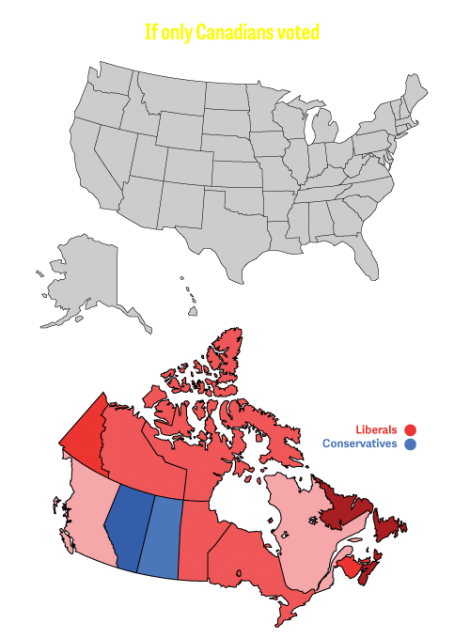[dropcap]”[/dropcap]Please welcome to the stage former Speaker to the House of Representatives… Newt Gingrich!” The audience erupted with applause as the 73-year-old American politician walked on to the stage. This was not, however, Republican presidential nominee Donald Trump’s rally in the heart of Pennsylvania.
Gingrich, in fact, was standing on stage at Roy Thomson Hall in downtown Toronto at the September 30 US election Munk Debate: be it resolved, Donald Trump will make America great again.
Rudyard Griffiths, the moderator for the debate, introduced Gingrich and his fellow debaters to a full audience. Before the debaters began to spar, he revealed the results of a poll taken earlier in the evening by the assembled attendees.
“Let’s finally review the 3,000 people in Roy Thomson Hall who voted on tonight’s resolution coming in to the debate.” The audience began to laugh and Griffiths, in on the joke, proclaimed, “It’s downtown Toronto… Canada!” The results of the poll showed that 86 per cent of audience members disagreed that Donald Trump could make America great again, while 14 per cent agreed.
The audience laughed again, likely 86 per cent out of entertainment over their current situation and 14 per cent out of the incredulity of sitting in a hall with 3,000 Canadians who paid to watch four people, none of whom were presidential nominees, debate a single facet of an election in which they cannot vote.
Canadians have a habit of gawking at the goings-on of our southern neighbour. Interest in their domestic affairs tends to ebb and flow with the presidential election cycle. As the hundreds of international relations and political science students will readily inform you, paying attention to American politics is important for Canadians.
The United States is Canada’s largest trading partner, a close military ally, and a member of several important treaties, such as the North America Free Trade Agreement (NAFTA). Whether Canadians like it or not, having the world’s longest undefended border suggests that Canada and the United States are very close.
Campaign without borders
It seems logical for Canadians to draw the line of their involvement in the American election at watching late night talk shows or killing time during a TTC delay by reading The New York Times’ “Politics” section. Yet, there are Canadian university students that have taken the time, energy, and money to travel to the United States to participate in the electoral matchups between Bernie Sanders and Hillary Clinton, and later Clinton and Donald Trump.
Amanda Harvey-Sanchez, a third-year student studying Anthropology and Environmental Studies, may have said it best: “I’m way too into American politics to not be a citizen. I’m not even voting.”
Harvey-Sanchez is a Canadian citizen, her parents are Canadian citizens, and she only lived in the United States for one year at the age of four. Last April, before the New York Democratic primary, Amanda travelled to the state to volunteer for the Sanders campaign. Recalling her decision to get involved, she said, “I think Bernie inspired me so much and I don’t think we have a candidate in Canada like that. And if we don’t have a candidate like that in Canada, I need to go down and be a part of that.”
She canvassed for the Vermont senator, and a friend working on the campaign got her into the front row of a rally with an estimated 27,000 people in attendance. Sanders subsequently lost the primary to Democratic nominee Clinton.
Harvey-Sanchez only recently got involved in American politics. Developing a passion for environmental justice and climate change in university prompted her to pay more attention.
“When I came to university, I got more involved and more aware… especially because I’m involved in climate activism,” she said. “Obama’s decision on the Keystone [XL Pipeline] and various climate policies made me want to be interested, and then I paid attention to it more.”
Alex Cohen is a fourth-year Political Science student. He has been involved in politics for as long as he can remember and is a self-professed political nerd. While originally a Sanders supporter, Cohen says he would support Clinton if he could vote. “I’m a fan of President [Barack] Obama and even Bill Clinton,” he added.
He travelled to Philadelphia in July to attend the Democratic National Convention (DNC), where he was in the audience for speeches by President Obama, First Lady Michelle Obama, and the Khan family, as well as other headlining speakers. He also attended the DNC in 2012 when Obama was up for re-election.
While Cohen described the convention as the Disneyland of politics, “it wasn’t all fun,” Cohen said. “There was a lot of waiting, a lot of standing, a lot of buses, just to get to the arena. There was an armed guard on each bus. In America, they don’t do things subtly.”
He also spent a significant amount of time in New Hampshire a week before the September primary vote. He saw many Republican candidates speak, including Trump. After a hesitation, Cohen added, “New Hampshire is probably more Disneyland than the DNC. [The candidates] are all spread across a very small state and you can just roll up to one of their events.”
Both Harvey-Sanchez and Cohen would consider themselves politically active in Canada. Cohen is a past president of the U of T Liberals, while Harvey-Sanchez has worked with New Democratic Party politician Olivia Chow and focused on activist work.
Both were involved with the Democratic Party, which is typically seen as the left-of-centre party in the United States.
In a 2015 study, the Broadbent Institute surveyed over 8,000 Canadians and found that a person was more likely to be left leaning, if under the age of 35. Being from Ontario, attending university, and living in a large city also increased the likelihood that a Canadian would lean more to the left.
That does not mean that no one at U of T supports Trump. In late September, the Toronto Star reported that Calvin Vaughan, a quarterback for the U of T Varsity Blues football team, was a Trump supporter, after he was photographed wearing a Trump t-shirt. Vaughan is quoted in the article, saying, “If I wore this in Toronto, I would get beat up.” This statement may suggest that there may be others who share Vaughan’s perspective, but they are concerned about vocalizing their support for Trump in a fairly liberal city like Toronto.
The power and influence of the United States is a common reason why Harvey-Sanchez and Cohen believe it is important to be a part of American politics.
“It’s the largest advanced nation in the world, and I think a model in many ways for other countries,” said Cohen, when discussing how American politics affected him.
Harvey-Sanchez echoed this sentiment: “Everyone to some extent has to pay attention to US politics because of their position on the global stage,” she said.
Congress to Campus
Former US congressmen Martin Lancaster, a Democrat, and Steven Kuykendall, a Republican, were sponsored by the US State Department, the US Mission to Canada, and Congress to Campus — a program by the United States Association of Former Members of Congress to increase political literacy among youth — to visit several Ontario universities in late September.
As soon as they walked into Bar Mercurio flanked by three aides, you could immediately tell who they were. Both wore expensive, dark suits that were perfectly tailored, if a little loose fitting. Every gray hair was in place, lapel pins were perfectly straightened, and they were confident and relaxed despite their packed schedules.
Kuykendall quipped, “[Congress to Campus is] fun but much like Congress, the worst part of the job is travel.”
When asked what he thinks the cause for international fascination with American politics is, Kuykendall’s answer was simple: “Of course, by virtue of who we are,” he said. “The United States is influential: economic, academic, military or pick one, it has influence.”
Kuykendall was delighted by his interactions with Canadian students. “I’m just astounded by the degree of interest… and the people studying the political system.”
“Interest and knowledge,” chimed in Lancaster through sips of tea. While Kuykendall has visited Canada and England several times as part of Congress to Campus, it was Lancaster’s first foreign trip with the organization.
“This morning, we had a question that was top of the line,” Kuykendall elaborated. “It was all students, probably about 50 of them and they were asking questions for about an hour.”
For the love of celebrity
Yet, so much of this election — really any election –— hinges on domestic rather than international policy. For example, back in the primaries, Sanders advocated for free college education. As a Canadian student, Cohen said, “I know that free college would not benefit me.”
Granted, addressing these domestic issues may have an impact on international policy, but that does not necessarily explain Canadians’ inspiration to be involved.
Perhaps there is a different underlying reason that creates a desire to get involved. Celebrity is an important factor of the perception of American politics. In talking about her experience at the Sanders rally, Harvey-Sanchez described it as a “star-struck moment” for her.
Cohen was even more enthusiastic: “I definitely think that the thing with American politics is that it’s entertaining, it’s a big show. It’s television, it’s Hollywood.”
Even members of Congress can sometimes lose themselves to the grandeur of the American political system. Kuykendall recalled a private, formal dinner held in the Statuary Hall in the Capitol building.
“I thought ‘oh boy,’ and I’m looking around at all these statues of important people and sitting on the floor of what was the old House Chamber. I guess I’m not in Oklahoma anymore,” he said.
There is a stargazing aspect to American politics. Television shows such as House of Cards, which is a dramatization of the American political system, have a Canadian audience. Lancaster commented succinctly on the show: “I found it very unrealistic. That would never happen.”
Even older fictional television shows still have fan bases, such as The West Wing, which details the everyday lives of fictional White House staffers. Kuykendall recalled, “When I was in Congress, when The West Wing was on television, my staff knew that I was supposed to be home on Wednesday nights by 9:00.”
American political competition is especially unique in the eyes of Canadian students. Kuykendall described their perception of it as “exotic and unusual. Not many places have a government like ours,” he said.
While domestic American policies cannot directly benefit Canadians, they cannot have a direct negative effect on Canadians either. It’s like going to Vegas and gambling with someone else’s money. You can brag freely if you win, and you can also easily shrug off the loss, since it wasn’t your own money.
Yet, this argument only holds up for so long. The difference between a president and an A-list movie star is that everything a President or government official says or does is likely to have tangible implications.
So for those Canadians who enjoy the rush of politics and the high stakes game of power and polls, the pull of the American presidential race is great.
For some Canadian students, this manifests itself as becoming directly involved with American politics, while for others it’s relaxing in Roy Thomson Hall on a Friday night and taking bets on who they think will make America great again.





